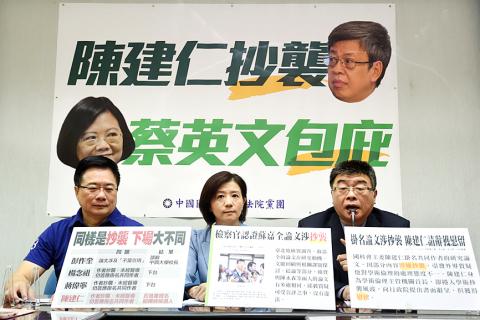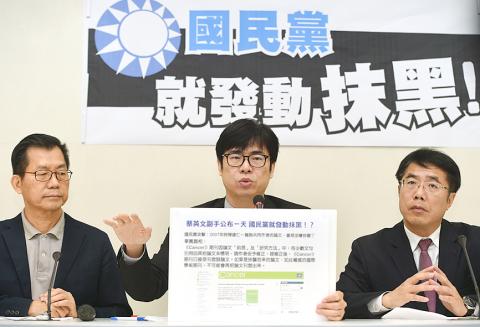Chinese Nationalist Party (KMT) lawmakers yesterday attacked former Academica Sinica vice president Chen Chien-jen (陳建仁), Democratic Progressive Party presidential candidate Tsai Ing-wen’s (蔡英文) running mate, for alleged plagiarism in a paper he co-authored in 2007.
KMT caucus deputy whip Alicia Wang (王育敏) said that Chen, who was National Science Council deputy director at the time, had been “protected” by Tsai, who was vice premier at the time, and did not have to resign his post.
Wang said Chen and Tsai owed the public an explanation, given that former Council of Agriculture minister Peng Tso-kwei (彭作奎), former deputy minister of defense Andrew Yang (楊念祖) and former minister of education Chiang Wei-ling (蔣偉寧) all resigned from their posts because of plagiarism allegations.

Photo: Liao Chen-huei, Taipei Times
“If Tsai becomes president, is she going to select more political appointees of this kind for the Cabinet? Will she hold political appointees to a higher moral standard?” Wang said.
Former KMT legislator Chiu Yi (邱毅) said the medical journal Cancer found out in January 2007 that a paper Chen co-authored with then-National Taiwan University Hospital vice president Yang Pan-chyr (楊泮池) and another doctor at the hospital had plagiarized other material.
Yang issued an apology and resigned, but Chen claimed not to have read the paper, Chiu said.

Photo: Liao Chen-huei, Taipei Times
“Tsai Ing-wen really likes plagiarizers when she is picking vice-presidential candidates,” KMT Legislator Alex Tsai (蔡正元) said, noting that former Council of Agriculture chairman Su Jia-chyuan (蘇嘉全), Tsai’s running mate in the 2012 poll, had also been accused of plagiarism in his masters’ thesis.
Tsai said that the Cancer incident arose from a citation error that the principal author made in the manuscript, which was discovered by the journal’s evaluating committee and amended by the author prior to the paper’s publication.
“If there was plagiarism, an internationally renowned and authoritative publication such as Cancer would never have published the paper,” she said. “The KMT has always tried to play up partisanship, reports of scandals and blackmail at the end of an election cycle. This is a bad practice.”
Her staff were aware of the allegation against Chen and had already investigated it, she said.
Noting that a Facebook account purporting to belong to Chen appeared on Monday immediately after Tsai’s announcement of her running mate, Tsai said: “It is better to act with honesty and integrity in elections. Little tricks like these are hardly necessary and with only two months left to go, I hope we can all work together to keep this classy.”
Chen also responded to the KMT’s allegations, saying “flawed sentence construction in English” was responsible for the error in the Cancer story and that he was “disappointed” that the KMT has “yet again resorted to negative campaigning.”

AGING: As of last month, people aged 65 or older accounted for 20.06 percent of the total population and the number of couples who got married fell by 18,685 from 2024 Taiwan has surpassed South Korea as the country least willing to have children, with an annual crude birthrate of 4.62 per 1,000 people, Ministry of the Interior data showed yesterday. The nation was previously ranked the second-lowest country in terms of total fertility rate, or the average number of children a woman has in her lifetime. However, South Korea’s fertility rate began to recover from 2023, with total fertility rate rising from 0.72 and estimated to reach 0.82 to 0.85 by last year, and the crude birthrate projected at 6.7 per 1,000 people. Japan’s crude birthrate was projected to fall below six,

Conflict with Taiwan could leave China with “massive economic disruption, catastrophic military losses, significant social unrest, and devastating sanctions,” a US think tank said in a report released on Monday. The German Marshall Fund released a report titled If China Attacks Taiwan: The Consequences for China of “Minor Conflict” and “Major War” Scenarios. The report details the “massive” economic, military, social and international costs to China in the event of a minor conflict or major war with Taiwan, estimating that the Chinese People’s Liberation Army (PLA) could sustain losses of more than half of its active-duty ground forces, including 100,000 troops. Understanding Chinese

US President Donald Trump in an interview with the New York Times published on Thursday said that “it’s up to” Chinese President Xi Jinping (習近平) what China does on Taiwan, but that he would be “very unhappy” with a change in the “status quo.” “He [Xi] considers it to be a part of China, and that’s up to him what he’s going to be doing, but I’ve expressed to him that I would be very unhappy if he did that, and I don’t think he’ll do that. I hope he doesn’t do that,” Trump said. Trump made the comments in the context

SELF-DEFENSE: Tokyo has accelerated its spending goal and its defense minister said the nation needs to discuss whether it should develop nuclear-powered submarines China is ramping up objections to what it sees as Japan’s desire to acquire nuclear weapons, despite Tokyo’s longstanding renunciation of such arms, deepening another fissure in the two neighbors’ increasingly tense ties. In what appears to be a concerted effort, China’s foreign and defense ministries issued statements on Thursday condemning alleged remilitarism efforts by Tokyo. The remarks came as two of the country’s top think tanks jointly issued a 29-page report framing actions by “right-wing forces” in Japan as posing a “serious threat” to world peace. While that report did not define “right-wing forces,” the Chinese Ministry of Foreign Affairs was